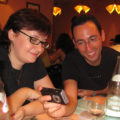Lynn Truss, author of Eats Shoots and Leaves has a new rant out about how the world’s manners are going to pot, and her personal crusade to reverse this phenomenon. I totally sympathize.
I ride the schoolbus in the mornings. That is to say, I take the normal bus line that goes down the hill to Lecco’s railway station, but I happen to take the run that’s scheduled for the benefit of kids going to school. It’s a small bus, and fills up quickly.
Six to eight kids get on at the same stop I do. Even when the bus pulls up with its door right in front of me, they crowd in to get on before me and get seats. A couple of unfortunate older women who get on at later stops have no hope of getting seats, nor does it ever occur to the kids to offer them. A 10-year-old boy who gets on at a stop before mine routinely uses his backpack to hold a seat for a friend. One day an older woman got on, and I suggested to the boy that he give this seat to the lady. He just looked at me as if I was from Mars, and did not even answer. Perhaps his mommy told him not to speak to strangers. (I could have offered the lady my own seat, but she was quickly so hemmed in with backpacks that she probably preferred not to struggle through to it).
Another day he went so far as to reserve two seats. I gently suggested that it would be polite of him to offer one seat to the lady. He stared at me as if “good manners” was a novel concept. I asked him what his mother would think of him not offering a seat. He’s still young enough to respond to this sort of guilt trip so, reluctantly, he complied. He was too shy to tell the lady (she was standing by the door facing the other way), so I called her over and said: “This young gentleman would like to offer you a seat.” She and I smiled at each other complicitly. Later, after he got off, we shook our heads sadly together over the shocking behavior of today’s youth.
Older kids are harder to embarrass. One day, when I had had more than enough of the kids trying to climb in front of me, I spread my arms, blocked the door, and said jokingly (but firmly): “Let the old lady [meaning myself] get a seat.” An adolescent boy took exception to this, and afterwards Ross, when travelling alone, often heard him muttering imprecations about me when he thought she had her iPod on and couldn’t hear him (“That’s the daughter of that bitch…”). Ross told me about this; she was touchingly angry about it (I didn’t care), and considered whether to confront him, or maybe have her older friends beat him up.
No need for violence: Ross is quite scary enough all by herself. One day as we got on the bus together, she leaped on and grabbed a seat, right next to this boy. That was the last seat, so she offered it to me, and stood herself. I hadn’t even noticed the boy when Ross said to him, in a loud and dangerous voice: “Well, you’re sitting right next to my mother now. What are you going to do about it?” He just about sank into the floor. Perhaps that will have cured him of making rude remarks about people’s mothers. <smile>
Riding the Bus
Oct 4, 2006
I wrote last year about the irritations of riding the bus with the schoolkids in the morning. They haven’t learned any more manners this year. As always, they gather where they think the bus doors will be when it stops, then elbow each other to get in first. When I see the bus coming I move in that direction, but consider it beneath my dignity to blatantly step in front of them all – someone’s got to set an example of civilized manners. Once the door is open, I let those ahead of me in “line” board, politely but firmly block anyone else from cutting in front of me (provoking some mutters, which I pretend to ignore), and, when finally on the bus, I give the driver an eye-roll about the kids’ lack of manners.
Evidently he agrees with me. The other morning, the bus pulled up very carefully and stopped a meter short of its usual position – right in front of me. I assumed that this was just coincidence, but as I stepped onto the bus, rightfully before everybody, the driver gave me a complicit grin. I smiled sweetly back. We’d pulled one over on the kids for once.
International Manners
Jan 17, 2006
In response to the above, Rick Freeman wrote:
“We were in Bermuda some while ago, and perhaps the most memorable thing about the trip is the way people acted on the bus … it was beyond manners, more of a whole etiquette dance. Every time there was a stop, the people who sat checked to see who came in and how they ranked. Virtually everyone got up at some point and gave their seat to someone else (older, pregnant, etc.).
Not exactly the most interesting place I’ve visited, but certainly lots of people with good manners.”










